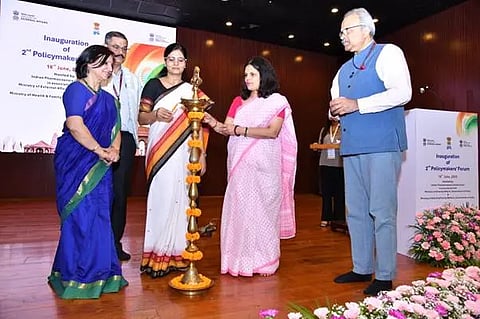

Union Minister of State for Health & Family Welfare and Chemicals & Fertilizers, Smt. Anupriya Patel, delivered the keynote address at the inaugural session of the Second Policymakers’ Forum organized by the Indian Pharmacopoeia Commission (IPC) in collaboration with the Ministry of External Affairs. The forum aims to promote the global recognition of the Indian Pharmacopoeia and strengthen collaboration around India’s flagship affordable medicine initiative—the Pradhan Mantri Bhartiya Janaushadhi Pariyojana (PMBJP).
The event brought together policymakers and senior drug regulatory officials from 22 countries across Africa, the Caribbean, and Latin America, including Liberia, Rwanda, Eswatini, Madagascar, Cuba, Chile, and others, along with delegates from the Caribbean Public Health Agency (CARPHA) representing Jamaica and Canada. This global engagement reflects India’s growing stature as a trusted partner in health diplomacy and builds on the momentum from the first Policymakers’ Forum held in August 2024, which led to multiple nations officially recognizing the Indian Pharmacopoeia as a drug standards reference.
In her address, Smt. Patel underscored India’s commitment to ensuring equitable access to quality-assured, affordable medicines. She emphasized the importance of regulatory harmonization in improving global health equity and noted that under the leadership of Prime Minister Narendra Modi, India has emerged as a hub for affordable healthcare solutions through capacity-building, knowledge-sharing, and international cooperation.
Highlighting the impact of Jan Aushadhi Kendras, she described them as instrumental in reducing out-of-pocket expenditure and expanding access to quality generic medicines. Smt. Patel also reaffirmed India’s leadership in vaccine supply, citing that 70% of WHO's vaccine supply originates from India. She referenced India’s Vaccine Maitri initiative, which supplied COVID-19 vaccines to over 100 countries during the pandemic.
Speaking on India's pharmaceutical capabilities, she noted that India supplies 14% of generics imported by the U.S. and houses the highest number of US FDA-approved drug manufacturing facilities outside the U.S. Seventy percent of Indian generics are exported to highly regulated markets, with pharmacopeial standards routinely benchmarked to global norms.
She also highlighted that India has retained WHO’s Global Benchmarking Tool (GBT) Maturity Level 3 status, reflecting the strength of its regulatory framework. Cuba recently became the 15th country to recognize the Indian Pharmacopoeia, a move that not only aligns regulatory standards but also facilitates smoother international pharmaceutical trade.
Union Health Secretary, Smt. Punya Salila Srivastava, reiterated India’s commitment to "One Earth, One Health" and the goal of universal health coverage. She noted that over 1.75 lakh Ayushman Arogya Mandirs now provide free drugs and diagnostics and emphasized the success of AB PM-JAY, which offers ₹5 lakh health coverage per family, benefitting 40% of India’s population.
The forum also featured a digital publication marking IPC’s 15-year journey and technical presentations on IPC’s standards development, CDSCO’s regulatory framework, and the PMBJP’s impact. Delegates will participate in technical sessions and site visits to IPC labs in Ghaziabad, Jan Aushadhi Kendras in Agra, and pharmaceutical manufacturing hubs in Ahmedabad over the four-day program.